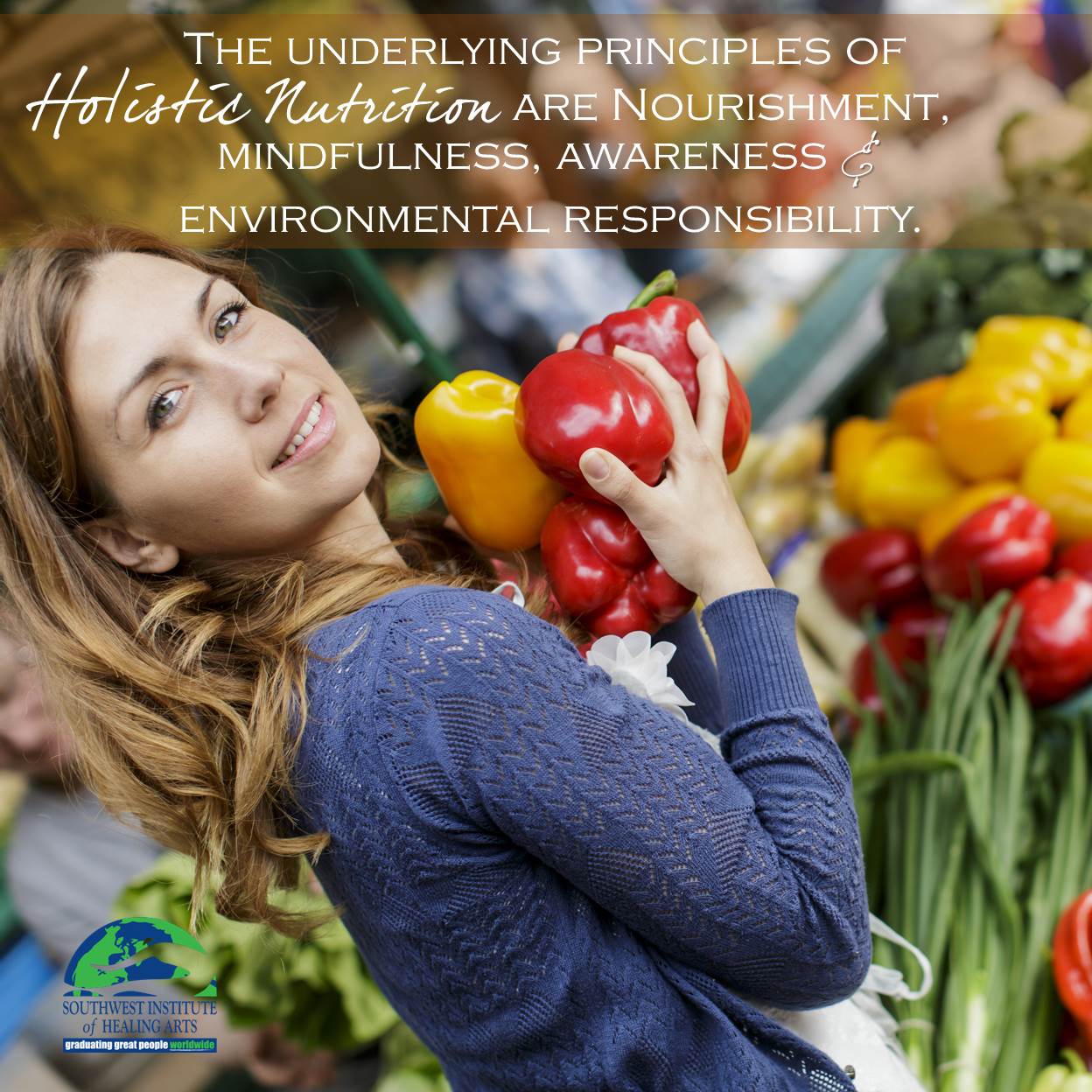 By Dee McCaffrey
By Dee McCaffrey
Nutrition is a big buzz word these days. Nearly every week we hear about the newly discovered health benefits of whole foods or the harmful effects of denatured processed foods. From the heart-protective antioxidants in grapes and dark chocolate, to the cancer-causing downside of refined sugar, our national awareness of the role food plays in our health is on the rise. Healthy food has gone mainstream, yet personal health is still a mystery to many people.
It’s no secret that the Standard American Diet, appropriately acronymed SAD, is the worst diet humans can engage in; it has created a health crisis unlike anything seen in human history. Within the last 100 years, we have gone from growing, harvesting, and preparing our own food with our own hands, to mass producing concoctions that are made in laboratories. In the name of progress, we have blindly and tragically denounced many of our traditional real foods as unhealthy, and replaced them with synthetic look-alikes. Out of fear of rising cholesterol levels and heart disease, we swapped real eggs for Egg Beaters, and real butter for margarine.
Artificial sweeteners, artificial colorings, flavor enhancers, stabilizers, hormones, antibiotics, trans-fats, preservatives, and pesticides have infiltrated our pantries and eateries, stripping us of our birthright of good health. Most recently, in the 1990’s, genetically modified foods (GMO’s) were unleashed into our food supply without ever being tested for human safety. Since then, the incidences of food allergies, digestive disorders, and even cancers have risen sharply.
 We’ve become so far removed from foods in their natural state, that we now call them “health foods,” a SAD admission that we’ve compromised our health for the sake of convenience. The effects of our nutrient deficient diets and sedentary lifestyles have taken their toll, not just on our body, but also on our soul and psyche. Traditional wisdom and sheer intuition tell us that not only is it unnatural to replace real food with chemical concoctions, it simply cannot be sustained.
We’ve become so far removed from foods in their natural state, that we now call them “health foods,” a SAD admission that we’ve compromised our health for the sake of convenience. The effects of our nutrient deficient diets and sedentary lifestyles have taken their toll, not just on our body, but also on our soul and psyche. Traditional wisdom and sheer intuition tell us that not only is it unnatural to replace real food with chemical concoctions, it simply cannot be sustained.
And Then Came Holistic Nutrition
In its simplest definition, nutrition refers to “the care and feeding of an organism.” Understanding how to properly care for and feed ourselves is one of our most important human responsibilities. Holistic nutrition involves much more than healthful food choices.
It encompasses the care and feeding of the whole person: body, mind, and spirit.
”Let food be thy medicine and medicine be thy food”Hippocrates
At its most profound level, health is not just the absence of pain, stress, or disease, but also an abundance of vitality, passion and purpose. It is the daily experience of wholeness and balance—a state of being fully alive. Getting to this state can begin with conscious and mindful food choices.
Holistic nutrition reaches beyond the conventional approaches of dieting and calorie counting, and employs a variety of approaches concerning food and nutrients, blending traditional ancient food wisdom from cultures around the world with modern scientific discoveries, as a way to individualize what works best nutritionally for each person. It takes into account a person's own culture, lifestyle, constitution, and how aggressive they want to be with obtaining the results that they want to achieve. Different illnesses, conditions or diseases have different nutritional requirements and each responds to diet and nutrition uniquely. This holistic approach provides ways for each person to participate in the care of their own health.
The underlying principles of holistic nutrition are nourishment, mindfulness, awareness and nutritional and environmental responsibility. It helps us to better understand food and appreciate it as an instrument of personal healing. Nourishing ourselves according to holistic nutrition principles becomes a wise, mature, and loving act of self-care.
Gradual Change From the Inside Out
The word diet comes from the Greek word dieta, which means discipline, or way of living. The Latin root of the word means “a day’s journey.” Holistic nutrition emphasizes and encourages us to approach changes in our food choices as a process to be taken one day a time. The key is to make real changes—changes we can live with successfully on a long term basis—in the way we approach food, fitness, and the challenges and opportunities of living. Changes are best achieved gradually, as an understanding of food and our own needs deepens.
 Although holistic nutrition is largely individualized, there are some basics that apply to all individuals who wish to follow holistic nutrition principles. One of the main tenets of holistic nutrition is to eat foods in their closest to natural form as possible. The focus is on eating more SOUL foods—that is foods that are Seasonal, Organic, Unprocessed, and Local. We find that these are the type of foods that provide our bodies with the highest levels of nutrients and life force energy. These are also the types of foods that humans have thrived on for thousands of years.
Although holistic nutrition is largely individualized, there are some basics that apply to all individuals who wish to follow holistic nutrition principles. One of the main tenets of holistic nutrition is to eat foods in their closest to natural form as possible. The focus is on eating more SOUL foods—that is foods that are Seasonal, Organic, Unprocessed, and Local. We find that these are the type of foods that provide our bodies with the highest levels of nutrients and life force energy. These are also the types of foods that humans have thrived on for thousands of years.
Here are some helpful holistic nutrition basics:
- Drink plenty of pure water each day. The amount of water each person needs is individual. To determine the total amount you need, divide your body weight by 2. The resulting number is the number of ounces of water your body needs. If you are not currently drinking enough water, gradually increase your intake by 8 ounces each week, until you have reached your optimal amount.
- Read ingredient lists and avoid foods with artificial ingredients. The basic rule of thumb is this: If you are buying a pre-prepared food that comes in a box or bag, make sure you know what all the ingredients are and if they have any known health effects. If the ingredient list includes chemical names you can’t pronounce, it’s a pretty sure bet that the product isn’t real or healthy. Some names of ingredients to avoid are: aspartame, sucralose, BHA, BHT, TBHQ, monosodium glutamate (MSG), sodium benzoate, nitrates and nitrites, partially hydrogenated oil, artificial colors and flavors, and anything with a number after it (Red 40, polysorbate 80, etc,) These are just a few ingredients with known links to such health effects as headaches, hyperactivity, and cancer.
- Eat loads of fresh fruits and vegetables, whole grains (if appropriate), and high-quality proteins. If you eat animal protein, select hormone-free, antibiotic-free organically raised meats, poultry, eggs and dairy. Animal proteins are best consumed in smaller amounts in comparison to the plants foods that make up the majority of your food intake.
- Eat at least 2 cups of green leafy vegetables each day, and strive to include an additional 2 cups of other brightly colored vegetables into your meals and snacks. Juicing some fresh vegetables is a great way to make sure you get the optimal amount each day
- If you do eat grains, expand your horizons and eat a diverse variety. Minimize wheat and glutinous grains, and instead try some quinoa, buckwheat, millet or teff.
- Avoid Genetically Modified Foods as much as possible. Over 90 percent of the corn, soy, canola, cottonseed, and sugar beets grown in the United States are from GMO seeds. A genetically engineered growth hormone, rBGH (recombinant bovine growth hormone) is used on conventionally raised dairy cows. Ingredients made from these crops are used in thousands of processed foods, so it’s best to stay away from as many processed foods as possible.
The USDA National Organic Program strictly prohibits the use of GMOs in any food carrying the USDA Organic Seal. So if your food carries the organic seal, you know it’s not made with GMOs. Also, pay attention to the little stickers with numbers on them when buying produce. If the item is conventionally grown, the number has four digits (for example, 4060 stands for broccoli). If the item is organically grown, the number has five digits starting with a 9 (so it’s 94060 for organic broccoli). If the number has five-digits beginning with an 8, that means the produce you are holding has been genetically modified.

- Eat small amounts of protein to tame sugar cravings.
- Minimize caffeine, sugar and alcohol. These are stimulants that interfere with the body’s natural detoxification pathways, inhibiting and negating your efforts at improving health. If you do drink coffee, make it organic as much as possible. Coffee beans are one of the crops most heavily sprayed with pesticides.
- Know which fats are healthy and which aren’t. Plant based saturated fats such as coconut oil and palm oil, and small amounts of butter are the best for baking and cooking because they are stable and don’t oxidize when heated, while monounsaturated fats like olive oil and avocados are less stable and provide the best health benefits when unheated or used with very low heat. Polyunsaturated fats like vegetable oils, nut and seed oils should be avoided. Obtain nut and seed oils from eating raw nuts and seeds instead, rather than as pressed oils. One exception is flaxseed oil, which if properly stored away from heat and light, can be added to foods.
- Finally, take the time to truly enjoy food. Chew slowly, savor the flavors, and gives thanks for the blessing of the life force energy being transferred into you.
Maintaining a lifestyle that incorporates holistic nutrition into every day food choices can be extremely beneficial to our overall health and well-being. Southwest Institute of Healing Arts (SWIHA) offers courses and programs in holistic nutrition, with specific focus on the concept of SOUL foods. For more information about holistic nutrition education, contact the SWIHA admissions department at 480-994-9244 or info@swiha.edu.
 About the Author, Dee McCaffrey
About the Author, Dee McCaffrey
Dee McCaffrey is an organic chemist turned nutritionist and weight loss expert. She is an internationally recognized author who lost 100 pounds and has kept the weight off for over two decades. Her passion lies in teaching others how to shop, cook, and eat healthfully, while serving as a role model and inspiration for sustainable weight loss and healthy living. Her book The Science of Skinny has helped thousands change their approach to food, eating and balanced health.
Dee is the lead instructor in Holistic Nutrition at the Southwest Institute of Healing Arts (SWIHA). Nutrition is Dee’s life—she lives it every second of every day. Whether she is coaching a client, writing an article, or creating a new recipe, her passion for healthful eating is the underlying energy that fuels everything she does.

